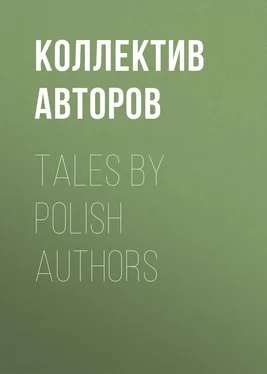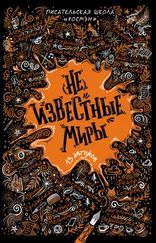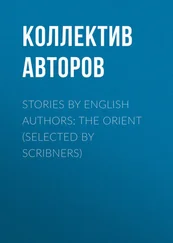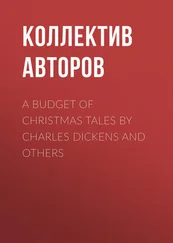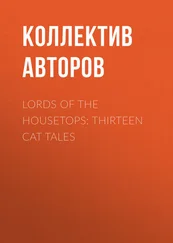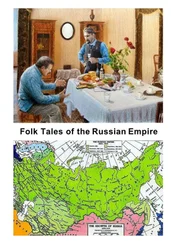Коллектив авторов - Tales by Polish Authors
Здесь есть возможность читать онлайн «Коллектив авторов - Tales by Polish Authors» — ознакомительный отрывок электронной книги совершенно бесплатно, а после прочтения отрывка купить полную версию. В некоторых случаях можно слушать аудио, скачать через торрент в формате fb2 и присутствует краткое содержание. Жанр: foreign_antique, foreign_prose, на английском языке. Описание произведения, (предисловие) а так же отзывы посетителей доступны на портале библиотеки ЛибКат.
- Название:Tales by Polish Authors
- Автор:
- Жанр:
- Год:неизвестен
- ISBN:нет данных
- Рейтинг книги:5 / 5. Голосов: 1
-
Избранное:Добавить в избранное
- Отзывы:
-
Ваша оценка:
- 100
- 1
- 2
- 3
- 4
- 5
Tales by Polish Authors: краткое содержание, описание и аннотация
Предлагаем к чтению аннотацию, описание, краткое содержание или предисловие (зависит от того, что написал сам автор книги «Tales by Polish Authors»). Если вы не нашли необходимую информацию о книге — напишите в комментариях, мы постараемся отыскать её.
Tales by Polish Authors — читать онлайн ознакомительный отрывок
Ниже представлен текст книги, разбитый по страницам. Система сохранения места последней прочитанной страницы, позволяет с удобством читать онлайн бесплатно книгу «Tales by Polish Authors», без необходимости каждый раз заново искать на чём Вы остановились. Поставьте закладку, и сможете в любой момент перейти на страницу, на которой закончили чтение.
Интервал:
Закладка:
'Bartoszu! Bartoszu! never lose hope!'
'The Poles, the Poles!' repeated the crowd by way of explanation, and, gathering round the carriages, admired their soldierly bearing, and added to their joy by relating anecdotes of the remarkable courage of these Polish Regiments.
Bartek had unshaven cheeks, which, in addition to his yellow moustache, goggle-eyes, and large bony face, made him look terrifying. They gazed at him as at some wild beast. These, then, were the men who were to defend Germany! Such were they who had just disposed of the French! Bartek smiled with satisfaction, for he too was pleased that they had beaten the French. Now they would not go to Pognębin, they would not make off with Magda, nor capture his land. So he smiled, but as his cheek hurt him badly, he made a grimace at the same time, and did certainly look terrifying. Then, displaying the appetite of a Homeric warrior, he caused pea-sausages and pints of beer to disappear into his mouth as into a vacuum. People in the crowd gave him cigars and pence, and they all drank to one another.
'There's some good in this German nation,' he said to Wojtek, adding after a moment, 'and you know they have beaten the French!'
But Wojtek, the sceptic, cast a shadow on his joy. Wojtek had forebodings, like Cassandra:
'The French always allow themselves to be beaten at first, in order to take you in, and then they set to until they have cut you to pieces!'
Wojtek did not know that the greater part of Europe shared his opinion, in general, and in particular now.
They travelled on. All the houses were covered with flags. They stopped a long while at several of the stations, because there was a block of trains everywhere. Troops were hastening from all sides of Germany to reinforce their brothers in arms. The trains were swathed in green wreaths, and the Lancers had decorated their lances with the bunches of flowers given them on the way. The majority of these Lancers also were Poles. More than one conversation and greeting was heard passing from carriage to carriage:
'How are you, old fellow, and where is God Almighty leading you?'
Meanwhile to the accompaniment of the train rumbling along the rails, the well-known song rang out: —
'Flirt with us, soldiers! dears!'
Cried the girls of Sandomierz.
And soon Bartek and his comrades caught up the refrain: —
Gaily forth the answer burst:
'Bless you, dears! but dinner first!'
As many as had gone out from Pognębin in sorrow were now filled with enthusiasm and spirit. A train which had arrived from France with the first batch of wounded, damped this feeling of cheerfulness, however. It stopped at Deutz, and waited a long time to allow the trains hurrying to the seat of war to go by. The men were marched across the bridge en route for Cologne. Bartek ran forward with several others to look at the sick and wounded. Some lay in closed, others in open carriages, and these could be seen well. At the first glance our hero's heart was again in his mouth.
'Come here, Wojtek,' he cried in terror. 'See how many of our countrymen the Frenchmen have done for!'
It was indeed a sight! Pale, exhausted faces, some darkened by gunpowder or by pain, or stained with blood. To the sounds of universal rejoicing these men only responded by groans. Some were cursing the war, the French and the Germans. Parched lips called every moment for water, eyes rolled in delirium. Here and there, amongst the wounded, were the rigid faces of the dead, in some cases peaceful, with blue lines round their eyes, in others contorted through the death struggle, with terrifying eyes and grinning teeth. Bartek saw the bloody fruits of war for the first time, and once more confusion reigned in his mind. He seemed quite stupefied, as, standing in the crowd, with his mouth open, he was elbowed from every side, and pomelled on the neck by the police. He sought Wojtek's eyes, nudged him, and said,
'Wojtek, may Heaven preserve us! It's horrible!'
'It will be just the same with you.'
'Jesu! Mary! That human beings should murder one another like this! When a fellow kills another the police take him off to the magistrate and prison!'
'Well, but now whoever kills most human beings is to be praised. What were you thinking of, Blockhead: did you think you would use gunpowder as in the manœuvres, and would shoot at targets instead of people?'
Here the difference between theory and practice certainly stood out clearly. Notwithstanding that our friend Bartek was a soldier, had attended manœuvres and drill, had practised rifle shooting, had known that the object of war was to kill people, now, when he saw blood flowing, and all the misery of war, it made him feel so sick and miserable he could hardly keep himself upright. He was impressed anew with respect for the French; this diminished, however, when they arrived at Cologne from Deutz. At the Central Station they saw prisoners for the first time. Surrounding them was a number of soldiers and people, who gazed at them with interest, but without hostility. Bartek elbowed his way through the crowd, and, looking into the carriage, was amazed.
A troop of French infantry in ragged cloaks, small, dirty, and emaciated, were packed into the carriages like a cask of herrings. Many of them stretched out their hands for the trifling gifts presented to them by the crowd, if the sentinels did not prevent them. Judging from what he had heard from Wojtek, Bartek had had a wholly different impression of the French, and this took his breath away. He looked to see if Wojtek were anywhere about, and found him standing close by.
'What did you say?' asked Bartek. 'By all the Saints! I shouldn't be more surprised if I had lost my head!'
'They must have been starved somehow,' answered Wojtek, equally disillusioned.
'What are they jabbering?'
'It's certainly not Polish.'
Reassured by this impression, Bartek walked on past the carriages. 'Miserable wretches!' he said, when he had finished his review of the Regulars.
But the last carriages contained Zouaves, and these gave Bartek food for further reflection. From the fact that they sat huddled together in the carriages, it was impossible to discover whether each man were equal to two or three ordinary men; but, through the window, he saw the long, martial beards, and grave faces of veteran soldiers with dark complexions and alarmingly shining eyes. Again Bartek's heart leapt to his mouth.
'These are the worst of all,' he whispered low, as if afraid they might hear him.
'You have not yet seen those who have not let themselves be taken prisoner,' replied Wojtek.
'Heaven preserve us!'
'Now do you understand?'
Having finished looking at the Zouaves, they walked on. At the last carriage Bartek suddenly started back as if he had touched fire.
'Oh, Wojtek, Lord help us!'
There was the dark – nearly black – face of a Turco at the open window, rolling his eyes so that the whites showed. He must have been wounded, for his face was contorted with pain.
'But what's the matter?' asked Wojtek.
'That must be the Evil One, it's not a soldier. Lord have mercy on my sins!'
'Look at his teeth!'
'May he go to perdition! I shan't look at him any longer.'
Bartek was silent, then asked after a moment:
'Wojtek?'
'Yes?'
'Mightn't it be a good thing to cross oneself before anyone like that?'
'The heathen don't understand anything about the holy truth.'
The signal was given for taking their seats. In a few moments the train was moving. When it grew dusk Bartek continually saw before him the Turco's dark face with the terrible white of his eyes. From the feeling which at the moment animated this Pognębin soldier, it would not have been possible to foretell his future deeds.
Читать дальшеИнтервал:
Закладка:
Похожие книги на «Tales by Polish Authors»
Представляем Вашему вниманию похожие книги на «Tales by Polish Authors» списком для выбора. Мы отобрали схожую по названию и смыслу литературу в надежде предоставить читателям больше вариантов отыскать новые, интересные, ещё непрочитанные произведения.
Обсуждение, отзывы о книге «Tales by Polish Authors» и просто собственные мнения читателей. Оставьте ваши комментарии, напишите, что Вы думаете о произведении, его смысле или главных героях. Укажите что конкретно понравилось, а что нет, и почему Вы так считаете.
